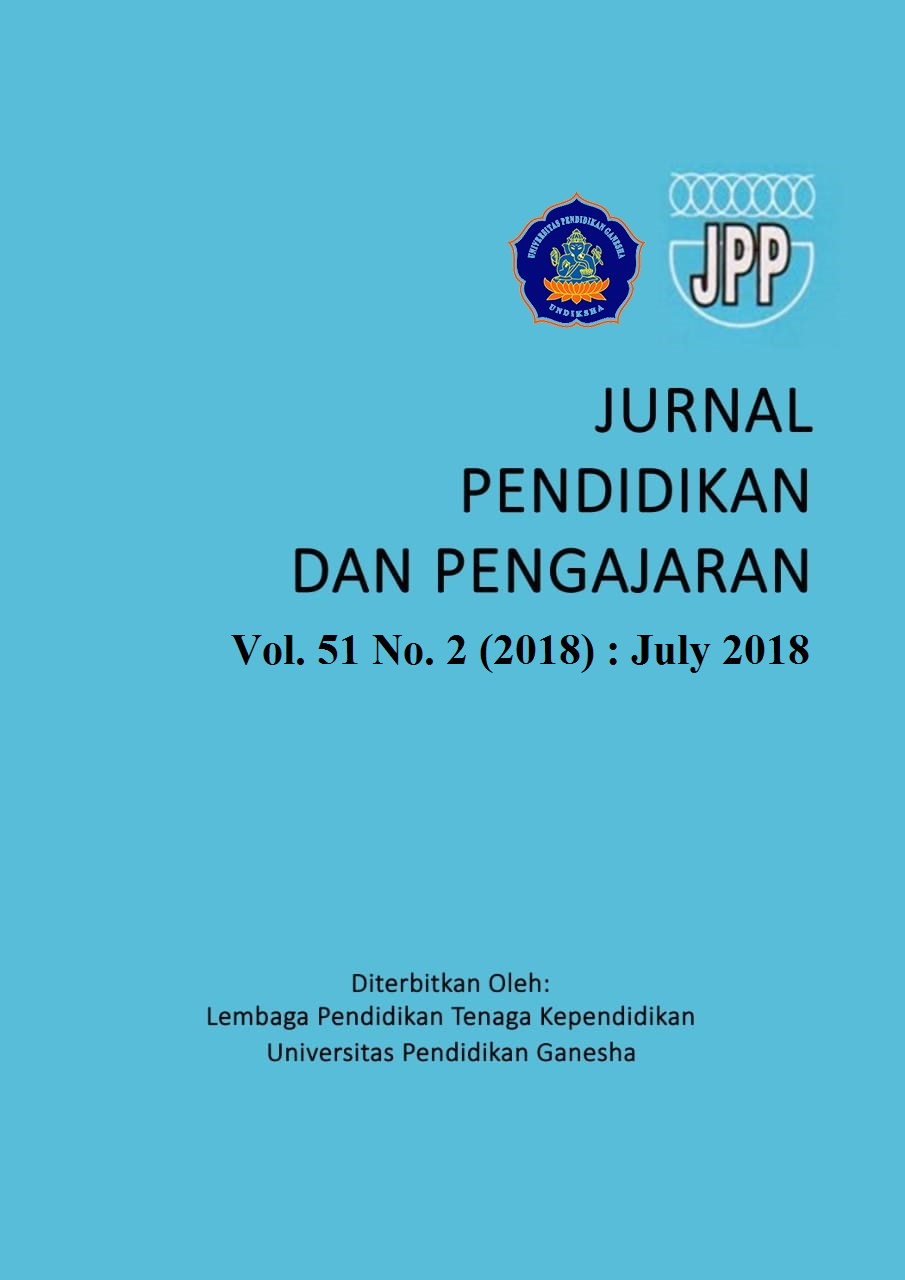Improving Mathematical Communication Skills Through The Implementation Of Reasoning And Problem Solving Model
DOI:
https://doi.org/10.23887/jpp.v51i2.13966Keywords:
Mathematical Communication Skills, Reasoning, Problem Solving.Abstract
The aim of this classroom action research was to improve the mathematical communication skills of 11th grade IIS students in SMAN 1 Blahbatuh. The subject of this study was 32 11th grade IIS students in SMAN 1 Blahbatuh in academic year 2017/2018. The results showed that the implementation of reasoning and problem solving learning model improved the mathematical communication skills of 11th grade IIS students in SMAN 1 Blahbatuh. The improvement could be seen from the students learning completeness that increased 6,3% from 3,1% in the first cycle became 9,4% in the second cycle and increased to be 78,2% in the third cycle. Besides that, students gave positive responses toward the implementation of reasoning and problem solving learning model with mean score 57,2. The improvement of students’ mathematical communication skills happened because of reasoning and problem solving learning model gave emphasis to students through guided-questions in constructing mathematical ideas, gave more opportunities to students in delivering opinion, and gave guidance and motivation to students.
References
Apriani, Ni Nengah Dwi. 2012. "Implementation of IMPROVE Learning Model on the Subject of Information and Communication Technology to Improve the Capability of Critical Thinking and Student Results of Class VIII B1 at SMP Negeri 4 Singaraja Academic Year 2011/2012". ISSN 2252-9063. Volume 1, Number 4, page 1.
Balim, A. G. 2009. The Effects of Discovery Learning on Students' Success and Inquiry Learning Skills. Egitim Arastirmalaria-Eurasian Journal of Educational Research, 35, 1-20.
Candiasa, I Made. 2010a. Testing of Research Instruments with Application of ITEMAN and BIGSTEPS. Singaraja: Publishing Unit of Ganesha University of Education.
_______, 2010b.Stativariat and BivariatStatistics Accompanied by SPSS Application. Singaraja: Publishing Unit of Ganesha University of Education.
Crawford, M. L. 2001. Teaching contextually: Research, rationale, and techniques for improving students' motivation and achievement in mathematics and science. Texas: CCI Publishing. Available at: http://www.cord.org/uploadedfiles/Teaching%20Contextually%20(Crawford).pdf
Depdiknas. 2006.Construction Guide for Mathematics Subject Mathematics. Jakarta: Director General of Management of Primary and Secondary Education, Diknas.
Komalasari, Kokom. 2013. Contextual Learning: Concepts and Applications. Bandung: PT Refika Aditama.
McNiff, J. 1992. Action Research: Principles and Practice. London: Routledge.
Pait, I Made. 2012. Influence of Problem Solving Learning Model and Formal Reasoning to Achievement of Mathematics Learning for Junior High School Students. Singaraja: Undiksha Postgraduate Technology Study Program.
Suarsini, et al. 2013. Influence Learning Model Reasoning and Problem Solving Against Students Learning Outcomes of Mathematics Grade V Elementary School in Gugus VIII Kecamatan Ubud. Universitas Pendidikan Ganesha Singaraja, Indonesia.
Suherman, Erman 2003. Learning Strategy for Contemporary Mathematics. Indonesian education university
Suryawan, I Putu Pasek. 2012. "Development of Mathematics Learning Tool for Learning Model and Problem-Solving Problem (MP3M) Issues Problem Is Open As Efforts To Increase Activity and Achievement Of Class VII Student Learning". Thesis Articles, July 2012
Suryawan, Pasek. 2014. "Development of Mathematics Learning Tool for Learning-Based Modeling and Problem-Solving Model (MP3M)". Journal of Mathematics and Science, Volume 8, Number 1, April 2014, page 26-44
Downloads
Published
How to Cite
Issue
Section
License
Authors who publish with Jurnal Pendidikan dan Pengajaran agree to the following terms:- Authors retain copyright and grant the journal the right of first publication with the work simultaneously licensed under a Creative Commons Attribution License (CC BY-SA 4.0) that allows others to share the work with an acknowledgment of the work's authorship and initial publication in this journal
- Authors are able to enter into separate, additional contractual arrangements for the non-exclusive distribution of the journal's published version of the work (e.g., post it to an institutional repository or publish it in a book), with an acknowledgment of its initial publication in this journal.
- Authors are permitted and encouraged to post their work online (e.g., in institutional repositories or on their website) prior to and during the submission process, as it can lead to productive exchanges, as well as earlier and greater citation of published work. (See The Effect of Open Access)





